Top 7 AI Tools for Multi-Channel Lead Scoring

Top 7 AI Tools for Multi-Channel Lead Scoring
AI tools are transforming lead scoring by analyzing data across multiple channels like email, social media, websites, and phone calls. They use machine learning to prioritize leads, helping sales teams focus on prospects most likely to convert. Here’s a quick look at the top tools:
Persana AI: Combines lead scoring with automated outreach across channels like email and LinkedIn.
HubSpot Lead Scoring: Offers multi-channel integration, CRM compatibility, and automation features; free and paid plans available.
MadKudu: Focuses on B2B predictive scoring, analyzing behaviors like product usage and email interactions.
ProPair.ai: Optimizes lead scoring and distribution, matching leads with the best-performing agents.
Saleshub.ai: Tracks buying signals and automates outreach across LinkedIn, email, and more.
Leadspace AI: Enriches lead profiles with external data and real-time scoring for B2B teams.
Salesmate: Combines CRM and lead scoring in one platform, suited for small to medium businesses.
Quick Comparison:
| Tool | Key Channels | AI Features | Pricing | Best For |
|---|---|---|---|---|
| Persana AI | Email, LinkedIn, Phone | Predictive analytics, automation | Custom pricing | Enterprise teams |
| HubSpot | Email, Social, Web, Chat | Real-time scoring, workflows | Free to $800/mo | All-in-one CRM users |
| MadKudu | Email, Web, Product usage | Behavioral analysis | Custom pricing | SaaS companies |
| ProPair.ai | Phone, SMS | Lead distribution optimization | Custom pricing | Mortgage and lending teams |
| Saleshub.ai | LinkedIn, Email, Web | AI-driven multi-channel outreach | $20-$150/mo/seat | LinkedIn prospecting |
| Leadspace AI | Email, Web, CRM data | Data enrichment, predictive scoring | Custom pricing | Enterprise B2B teams |
| Salesmate | Email, Web, Social | Machine learning scoring | $15-$50/user/mo | Small-medium businesses |
These tools improve efficiency, accuracy, and conversion rates, with businesses reporting up to a 15% revenue boost using AI-driven lead scoring. Choose based on your team’s size, channels, and budget.
Using AI for Lead Scoring (AI for Business People Series)
::: @iframe https://www.youtube.com/embed/z2RrZ1FzcMg :::
What to Look for in Multi-Channel AI Lead Scoring Tools
When choosing an AI lead scoring tool, focus on features that capture every customer interaction, accurately predict lead quality, and work seamlessly with your CRM. Here's a breakdown of what to prioritize.
Multi-channel integration should be at the top of your list. The right tool collects and analyzes data from various sources - websites, email campaigns, social media platforms, phone calls, and chatbots. This ensures you have a complete view of your prospect's journey. For example, platforms like HubSpot and Salesforce pull data from multiple channels to build detailed lead profiles. Without this capability, you risk overlooking key signals that indicate purchase intent.
The AI capabilities of the tool are critical for accurate lead scoring. Look for platforms that leverage machine learning, natural language processing, and real-time behavioral analysis. These features allow the tool to continuously refine its scoring models. Take Salesforce Einstein as an example - it uses predictive models that adapt as new data becomes available, learning from your sales trends to deliver better results over time.
CRM compatibility is a dealbreaker. Your lead scoring tool must integrate smoothly with your existing CRM to prevent data silos and reduce manual work. Platforms like Salesforce, HubSpot, and Zoho offer native integrations, allowing you to manage lead scoring directly within your CRM. This eliminates the hassle of switching between systems and minimizes errors during data transfers.
Automation features can make a huge difference in efficiency. Opt for tools that automate lead assignment, trigger workflows, and send real-time notifications. For instance, HubSpot and Zapier automate both the scoring process and follow-up actions, enabling sales teams to respond quickly to high-potential leads. Automation not only saves time but also speeds up the sales cycle.
Customization options are essential for aligning the tool with your specific business needs. Choose platforms that let you tailor scoring models based on your sales processes, target audience, and historical data. Tools like Salesforce Einstein and Zoho Zia allow you to adjust scoring criteria to match your goals, ensuring the tool works for you - not the other way around.
Scalability is another important factor, especially if your business is growing. The tool you select should handle increasing lead volumes and adapt to larger operations without slowing down. AI-powered platforms like Salesforce and HubSpot are built for growth, offering robust infrastructure and flexible pricing plans to accommodate your expanding needs.
Data privacy compliance is non-negotiable, particularly for businesses operating in the U.S. Ensure the tool complies with regulations like the CCPA and federal privacy laws. Leading platforms often include features like data encryption, consent management, and transparent data policies. Before committing, verify that the vendor's privacy practices align with legal standards and protect customer trust.
For example, a boutique HR consulting firm used an AI-powered CRM to score leads from website sign-ups, LinkedIn activity, and email engagement. The system identified high-converting profiles using historical and real-time data, automatically assigned scores, and suggested optimal follow-up times. This approach improved conversion rates and streamlined their sales process.
| Evaluation Criteria | Key Features to Verify | Impact on Performance |
|---|---|---|
| Multi-Channel Integration | Website, email, social media, phone, and chat data | Complete lead visibility across all touchpoints |
| AI Capabilities | Machine learning, natural language processing, behavioral analysis | Higher accuracy and adaptive scoring models |
| CRM Compatibility | Native integrations with Salesforce, HubSpot, and Zoho | Seamless workflow and reduced manual work |
| Automation Features | Lead assignment, workflow triggers, real-time notifications | Faster response times and improved efficiency |
| Customization | Adjustable scoring models and criteria | Alignment with specific business goals |
| Scalability | Enterprise infrastructure and flexible pricing | Long-term performance and growth readiness |
| Data Privacy | CCPA compliance, encryption, consent management | Legal protection and customer trust |
When evaluating tools, involve both sales and marketing teams to ensure alignment with your goals. Start by defining clear objectives and verifying your data quality meets the tool’s requirements. Regularly review scoring models and gather team feedback to maintain accuracy. Also, prioritize tools with transparent algorithms and explainable scoring logic to build trust and drive adoption.
AI SDR Shop
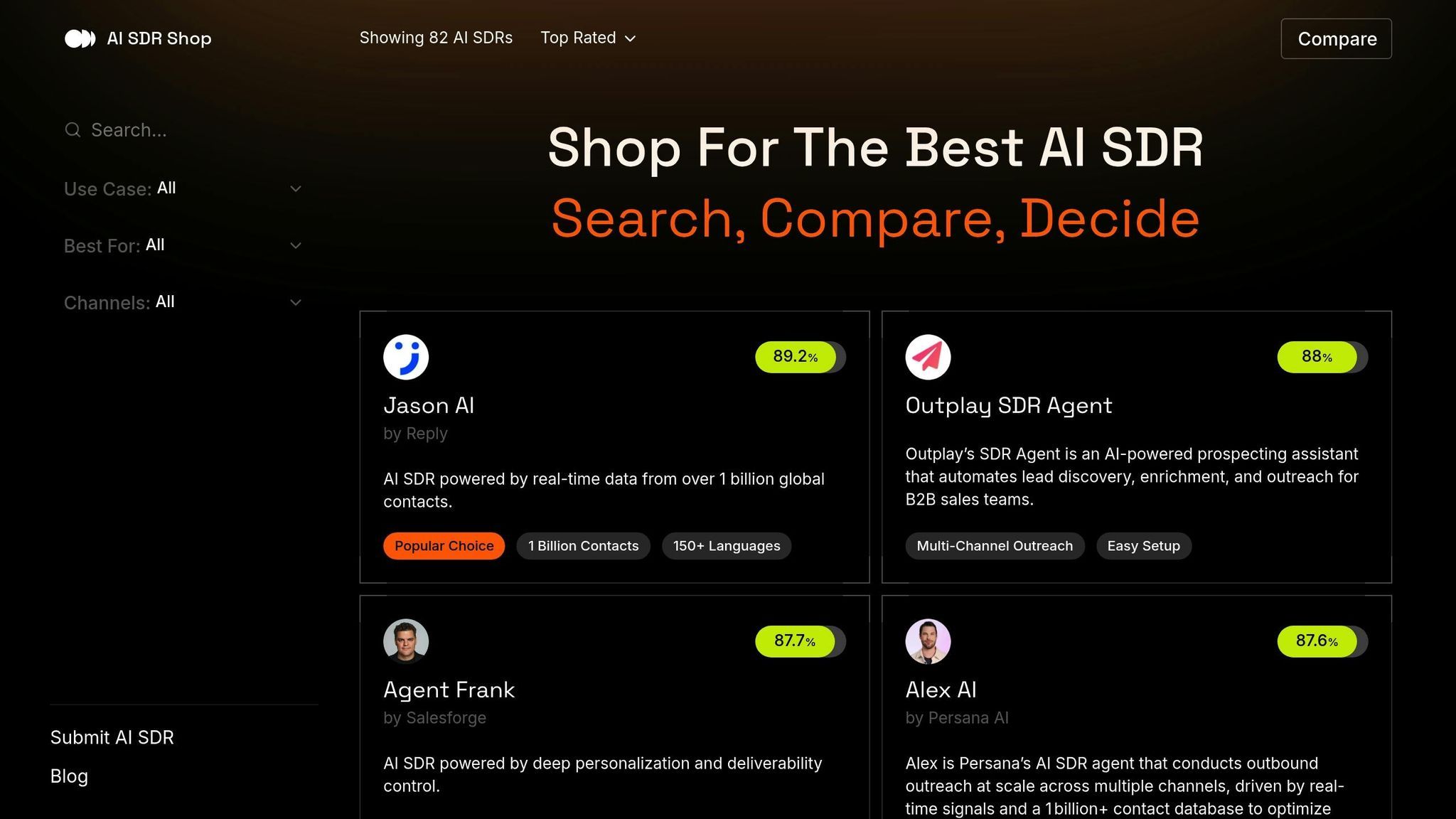
AI SDR Shop serves as a one-stop directory for businesses looking to explore and compare AI-powered Sales Development Representatives (SDRs) with multi-channel lead scoring abilities. With over 80 AI SDR agents listed in a single, searchable platform, it simplifies the process of evaluating options and making informed decisions. This centralized approach makes comparisons straightforward and efficient.
The platform’s "Search, Compare, Decide" framework takes the hassle out of what is often a lengthy evaluation process. Each SDR agent profile provides in-depth details, including supported communication channels, lead scoring methods, and integration options. For example, some agents boast extensive contact databases and advanced personalization features, complete with custom workflows[5]. These capabilities directly influence the effectiveness of multi-channel lead scoring strategies.
One standout feature is real-time data integration, ensuring that agents work seamlessly with popular CRMs like Salesforce, HubSpot, and Zoho, as well as tools like Slack and Microsoft Teams. This automation eliminates the need for manual updates, keeping lead scoring consistent across all channels.
The directory also offers an intuitive filtering system, allowing users to compare SDR agents based on key multi-channel features. Businesses can assess agents by their outreach capabilities, proprietary email systems, and intent-based lead identification tools. For instance, agents like Outplay SDR Agent, Landbase AI SDR, and Agentforce provide multi-channel outreach with highly customizable workflows and messaging that mimics human interaction.
Another major advantage of AI SDR Shop is its cost transparency. Businesses can access detailed profiles, comparison tools, and implementation resources at no cost. Pricing for individual SDR agents is displayed in US dollars, making it easy for American companies to evaluate costs and plan budgets effectively. These features align with modern multi-channel lead scoring strategies, ensuring businesses have the tools they need to succeed.
Each profile includes helpful resources such as setup guides, integration checklists, and vendor support links. Some even feature video tutorials and step-by-step onboarding instructions, enabling businesses to quickly deploy their chosen SDR agents for immediate results. This streamlined process ensures a smooth rollout across multiple channels.
The latest trends highlighted on AI SDR Shop reflect the industry's shift toward advanced lead scoring techniques. Many listed agents now incorporate real-time behavioral analytics, AI-driven personalization, and automated workflows. Additional features like intent detection, predictive analytics, and adaptive scoring models that evolve with new data showcase the cutting-edge capabilities of these multi-channel lead management solutions.
1. Persana AI
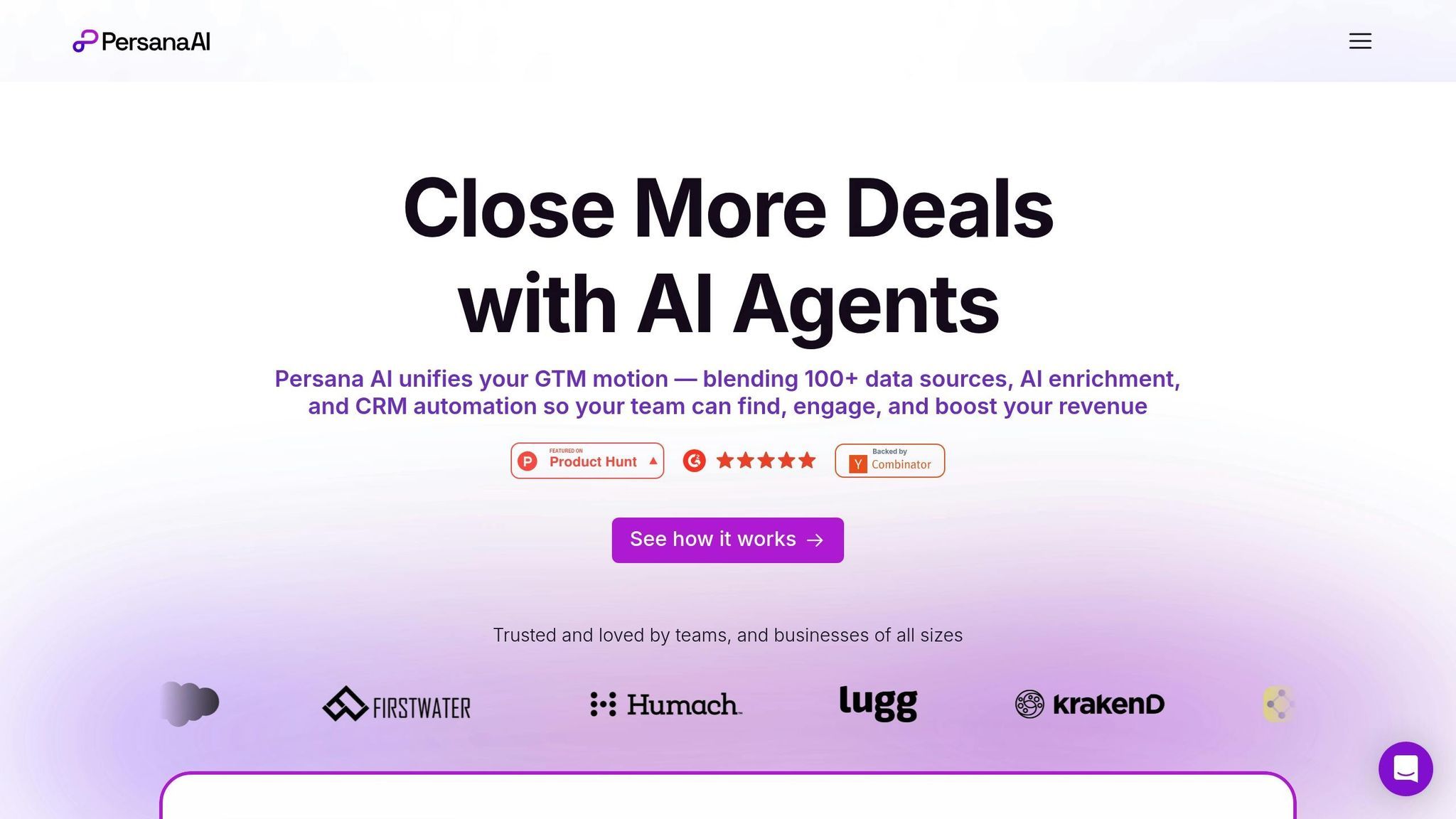
Persana AI is a platform designed to simplify lead generation and scoring by automating research and outreach across multiple channels. By combining AI-driven lead scoring with automated workflows, it helps sales teams connect quickly with the most promising prospects.
Multi-Channel Integration
Persana AI gathers engagement data from various channels - email, LinkedIn, phone, and chat - to provide a comprehensive view of each prospect's activity. For instance, it tracks actions like email opens, social media interactions, and chat responses simultaneously, feeding this data into its scoring algorithms. One U.S.-based SaaS company reported a 30% increase in qualified leads and cut manual research time by 20% using this platform [6].
AI and Machine Learning Capabilities
Using advanced machine learning, Persana AI analyzes both behavioral and demographic data in real time. Its scoring models continuously update based on new interactions, allowing sales teams to zero in on leads most likely to convert. Businesses leveraging Persana AI have achieved up to a 25% boost in lead conversion rates by identifying high-potential prospects more accurately and timing follow-ups more effectively [6]. The platform also integrates smoothly with CRMs, ensuring data flows effortlessly - a feature explored further below.
CRM and Platform Compatibility
Persana AI works seamlessly with popular CRMs like Salesforce and HubSpot. This integration ensures that lead scoring insights, engagement histories, and enriched profiles are accessible directly within existing sales workflows. By eliminating the need for manual data entry, it helps reduce inefficiencies and keeps information centralized.
Automation Features
Beyond its multi-channel capabilities, Persana AI automates essential sales tasks, such as personalized outreach, intelligent follow-up scheduling, and ongoing data enrichment from public and proprietary sources. These features streamline lead management, allowing sales teams to focus on closing deals. Pricing starts at a few hundred dollars per month for smaller teams, with enterprise-level plans available for businesses needing custom integrations and dedicated support [6].
2. HubSpot Lead Scoring
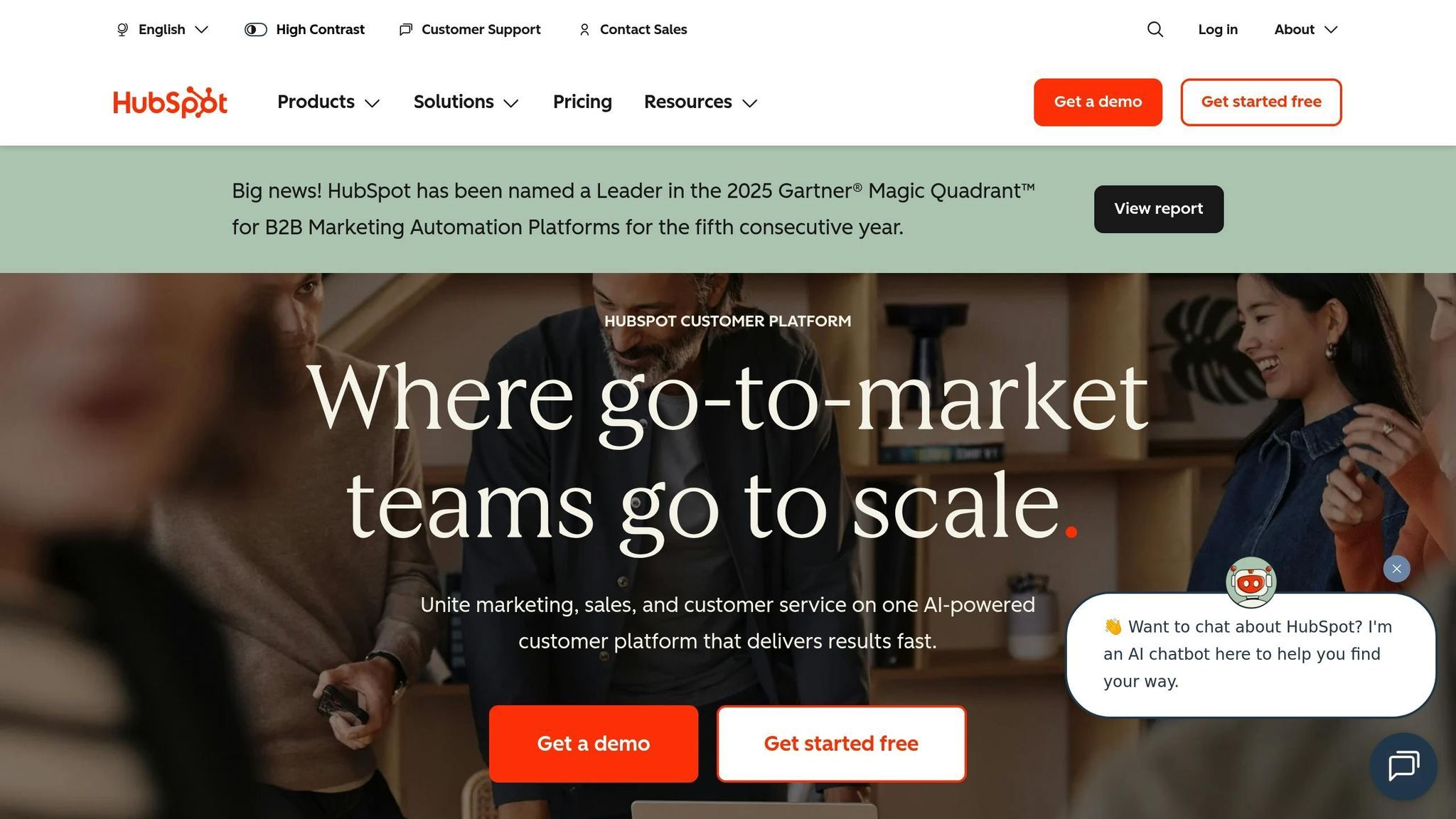
HubSpot Lead Scoring brings together marketing, sales, and service functions within its all-in-one CRM platform, making it easier for businesses to identify and act on high-quality leads.
Multi-Channel Integration
HubSpot pulls data from various channels - email, social media, website interactions, phone calls, and chat conversations - to build detailed engagement profiles. It tracks metrics like email open rates, click-throughs, website activity, and social media engagement. By consolidating this information, the platform enables dynamic scoring powered by its AI system.
AI and Machine Learning Capabilities
Using the data it collects, HubSpot's AI engine analyzes patterns in lead behavior to assign scores based on how likely a lead is to convert. These scores are updated in real time as new data flows in, giving sales teams the insights they need to focus on the most promising opportunities.
CRM and Platform Compatibility
HubSpot Lead Scoring integrates seamlessly with HubSpot CRM, ensuring that scores are visible within contact records, deal pipelines, and reporting dashboards. The platform also connects with other tools like Salesforce and Zapier, allowing businesses to sync lead data across multiple systems and maintain a unified view of their prospects.
Automation Features
HubSpot simplifies lead management with automation tools that trigger actions based on lead scores. For instance, when a lead reaches a specific score, the system can automatically send follow-up emails, assign tasks to team members, or update lead statuses. With integrations to external databases, it also enriches lead profiles with additional data, ensuring they remain current. These features are especially valuable for businesses running multi-channel strategies.
For example, a mid-sized U.S. marketing agency used HubSpot's automation tools to boost its lead conversion rate by 30% in just six months. By integrating with its existing Salesforce CRM, the agency improved collaboration between its sales and marketing teams [3].
Pricing
HubSpot offers flexible pricing to accommodate businesses of all sizes. Options include a Free Plan at $0, a Starter Plan at $15 per month per seat, and a Professional Plan at $800 per month [3].
3. MadKudu
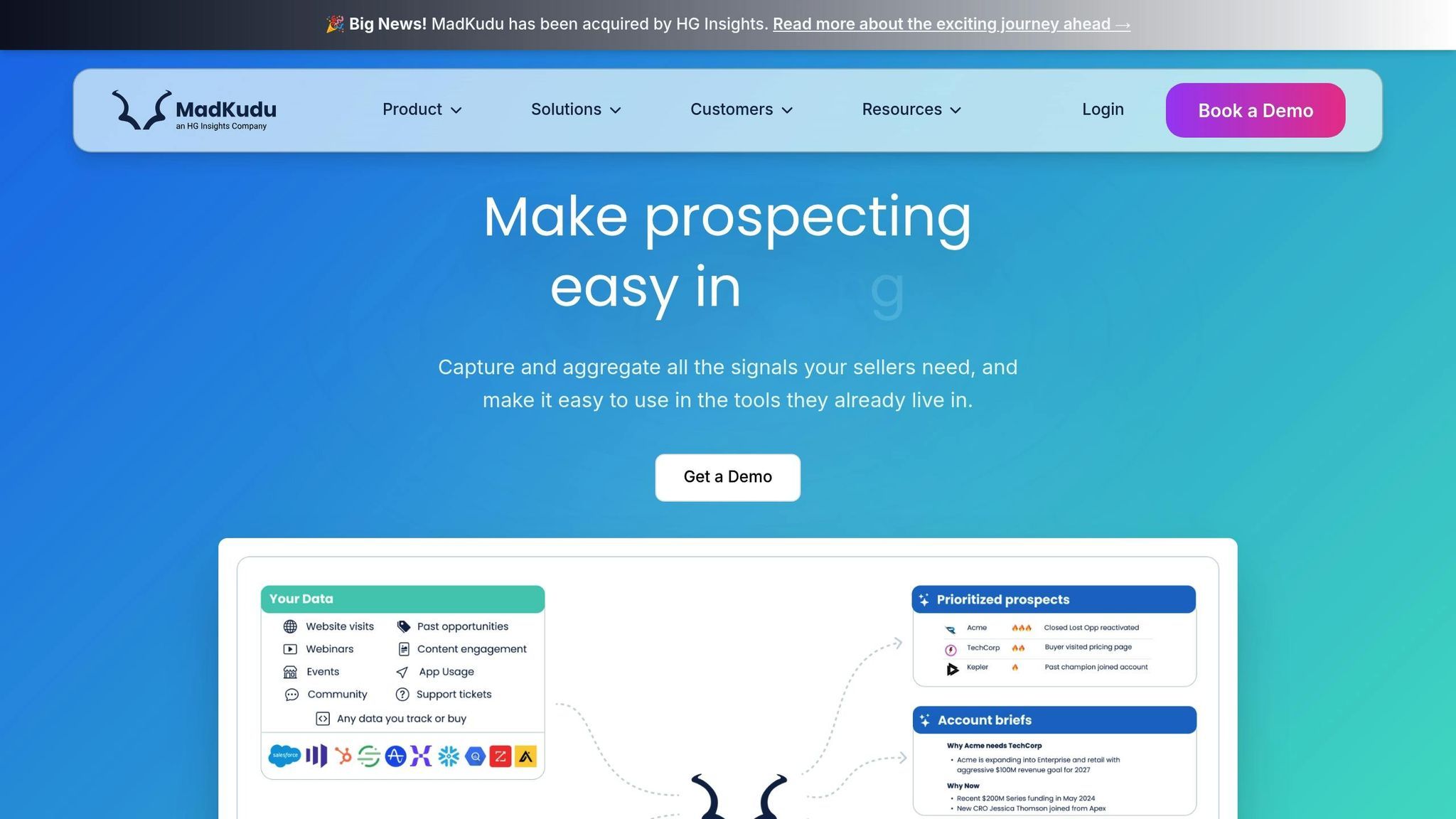
MadKudu is a predictive lead scoring platform designed to pinpoint high-value B2B leads by analyzing multiple touchpoints. It empowers sales and marketing teams to focus on the most promising prospects by evaluating their behaviors and engagement patterns in real time. Let’s take a closer look at how MadKudu uses data from various channels to deliver these insights.
Multi-Channel Integration
MadKudu pulls data from a variety of sources, including email interactions, website activity, product usage, and CRM records, to build detailed lead profiles. By combining behavioral insights with demographic information, the platform helps businesses not only track what potential customers are doing but also assess how well they align with the company’s ideal customer profile.
AI and Machine Learning Capabilities
At the heart of MadKudu is its Predictive Engine, which uses machine learning to identify product-qualified leads through behavioral analysis. The system continually learns from lead interactions, refining its models to provide precise, real-time scoring. For instance, if a prospect clicks on an email link, visits your website, or explores a product feature, their score is updated instantly. Additionally, businesses can customize scoring models, tweaking factor weights to align with their specific sales goals and buyer personas.
CRM and Platform Compatibility
MadKudu integrates seamlessly with popular CRM tools like Salesforce and HubSpot, ensuring that lead scores are automatically fed into existing sales workflows. It also connects with marketing automation platforms such as Marketo, creating a unified system where lead data remains consistent across all platforms. This integration simplifies lead management and keeps teams aligned.
Automation Features
The platform streamlines lead qualification by automating the scoring process and triggering actions when specific thresholds are met. For example, leads can be assigned to sales reps or added to targeted email campaigns directly through integrated CRM and marketing systems. This automation reduces the time spent on manual research, allowing sales teams to concentrate on high-priority opportunities.
One B2B SaaS company used MadKudu alongside Salesforce and a product analytics platform to score leads based on email engagement, website activity, and product usage. This setup enabled their sales team to quickly identify and prioritize high-intent leads across multiple channels, leading to noticeable gains in conversion rates and overall sales efficiency.
4. ProPair.ai
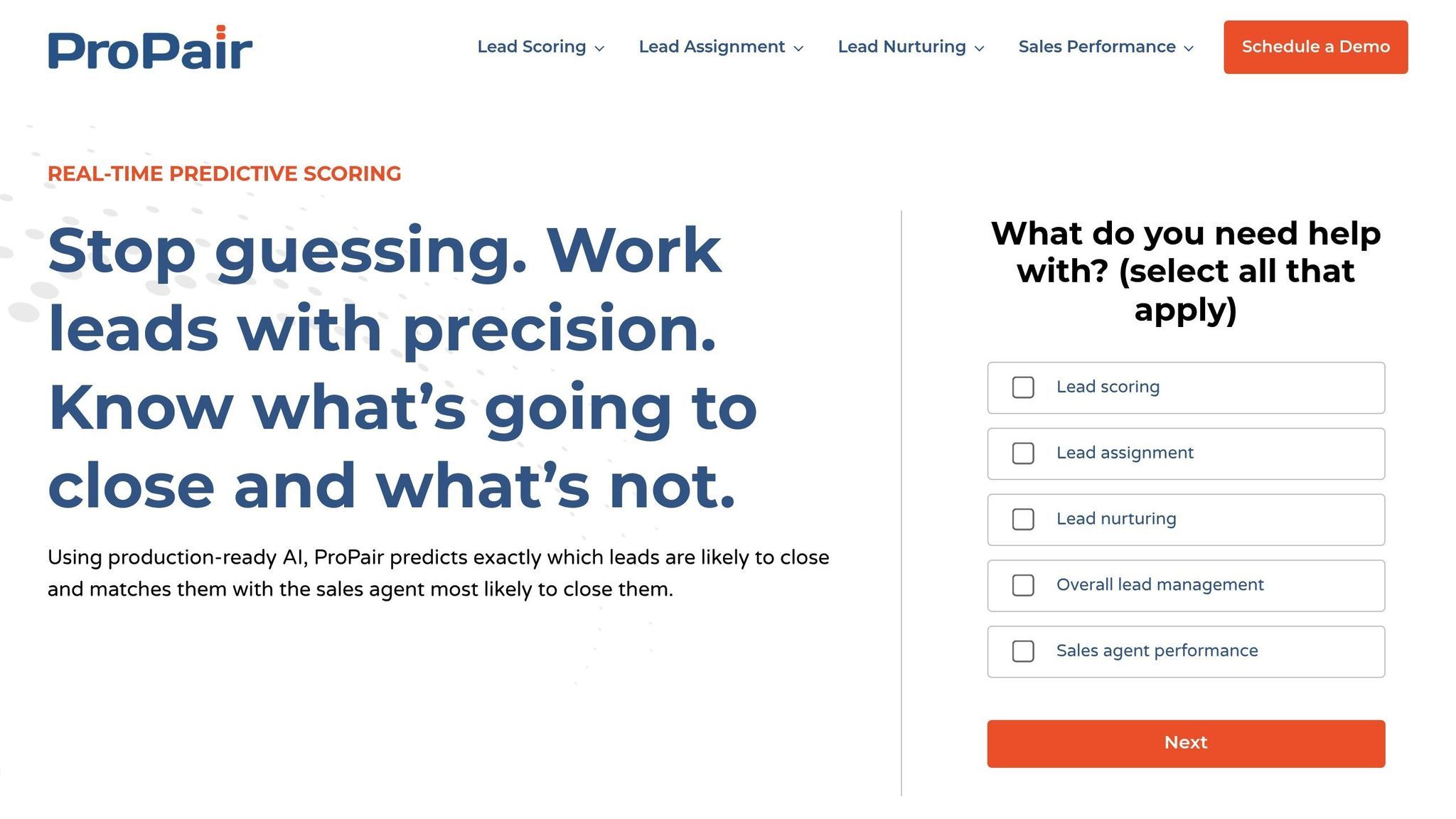
ProPair.ai takes multi-channel AI lead scoring to the next level by combining predictive lead conversion with smart lead distribution. This platform goes beyond the basics of lead scoring by not only identifying which leads are most likely to close but also matching those leads with the sales agents best equipped to convert them. By integrating lead quality data with insights into sales team performance, ProPair.ai offers a more refined and effective approach to lead management.
AI and Machine Learning Capabilities
At the heart of ProPair.ai’s system are three key components:
RANK: Delivers real-time predictive lead scoring using historical data.
MATCH: Assigns leads based on the past performance of individual agents.
MIX: Optimizes lead distribution to ensure maximum sales efficiency.
These machine learning algorithms continuously refine their predictions, learning from past data to improve accuracy over time. The best part? These insights integrate effortlessly with your current sales tools, making implementation seamless.
CRM and Platform Compatibility
ProPair.ai works with major CRM systems, including Velocify, ensuring it fits smoothly into your existing sales processes.
"We utilize ProPair's match-and-rank software within Velocify and we've experienced tons of success with it. ProPair helps us assign leads properly by isolating the right loan officer to work a lead at the right point in time. The products have given us more clarity into what our strongest lead actually is, rather than just looking at that lead's source."
Michael Zerr, VP Consumer Direct Marketing, BNC National Bank [7]
Automation Features
ProPair.ai automates the process of lead distribution and prioritization, ensuring that leads are assigned to the agents most likely to close the deal.
"As you mature as a mortgage lending organization, you need to make better use of your data. We now have ProPair and data in our corner to make smarter decisions with our resources and elevate our lead conversion results."
Kevin Smith, Senior Technology Manager, Ladera Lending [7]
"ProPair has fundamentally changed how we look at lead distribution. We look back at the days before ProPair and wonder why we used gut instinct and static workflows to make so many important decisions."
Dan Stevens, VP Mortgage Strategy, NBKC Bank [7]
sbb-itb-4c49dbd
5. Saleshub.ai
Saleshub.ai brings a fresh approach to multi-channel lead scoring by blending visitor intent tracking with AI-driven outreach. It keeps an eye on buying signals from over 3 million companies, helping businesses quickly engage with high-intent prospects [8].
One of its standout features is the ability to score visitor intent based on how users interact with your website - things like the content they consume and the time they spend on your pages. This scoring system then triggers personalized outreach campaigns, allowing your sales team to zero in on prospects who have already shown genuine interest in what you offer. Below, we’ll dive into how Saleshub.ai excels in integration, AI analytics, CRM compatibility, and automation.
Multi-Channel Integration
Saleshub.ai uses an "Omnichannel Execution" strategy to deliver consistent outreach across email, LinkedIn, phone, and text. It ensures your brand voice stays uniform while optimizing messaging for each platform [8]. The platform’s AI agents are no amateurs - they’ve been trained on 48 million email replies and 36 million LinkedIn message replies, enabling them to handle conversations intelligently across channels [8].
AI and Machine Learning Capabilities
The platform’s AI engine works behind the scenes, analyzing thousands of signals in real time. By leveraging machine learning, it prioritizes prospects based on how well they fit your target persona. It also continuously monitors intent signals, ensuring your team focuses on the most promising leads.
CRM and Platform Compatibility
Saleshub.ai integrates seamlessly with major CRM systems like HubSpot, Salesforce, Marketo, Pardot, Pipedrive, Insightly, and Attio. Beyond that, it connects with tools like Slack, Zapier, Gmail, Outlook, Calendly, and Zoho CRM. This ensures smooth compatibility with the tools you already rely on.
Automation Features
Automation is another area where Saleshub.ai shines. It syncs high-intent visitors directly to your CRM and kickstarts personalized outreach sequences. These workflows combine visitor intelligence with your sales tools, enabling tailored email sequences, dynamic LinkedIn campaigns, and real-time CRM updates based on intent scoring. It’s all about making your team’s job easier while keeping outreach precise and timely.
6. Leadspace AI
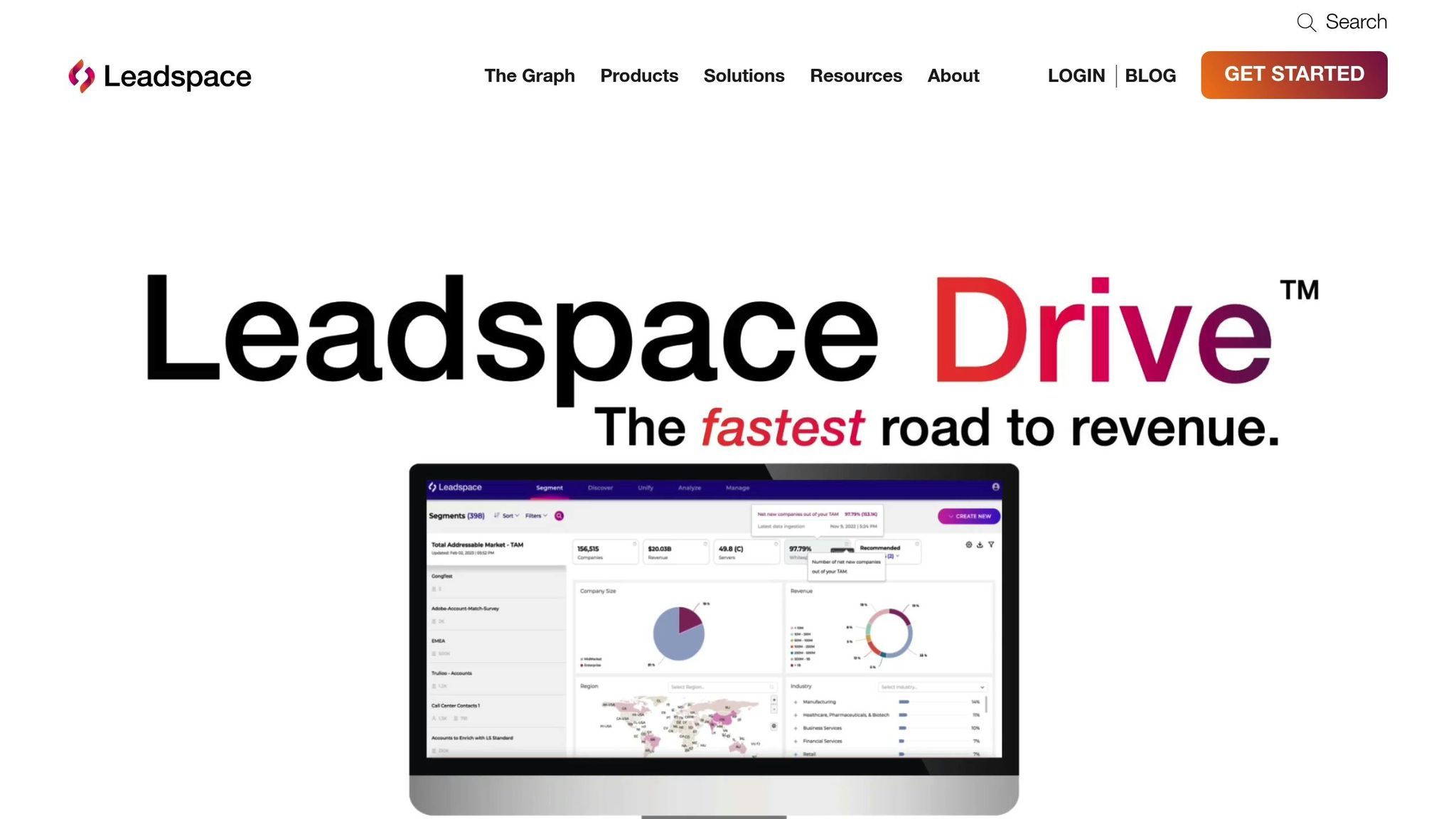
Leadspace AI is a B2B data platform that combines AI-powered lead scoring with advanced data enrichment tools. Major companies like Microsoft, SAP, and HP rely on it to consolidate scattered data and enhance lead scoring accuracy [2].
What makes Leadspace AI different is its ability to integrate internal CRM data with external intent signals [4]. The platform evaluates hundreds of factors in real time, including demographic details, firmographic insights, and behavioral patterns across various touchpoints.
AI and Machine Learning Capabilities
Leadspace AI uses machine learning to analyze historical conversion data alongside hundreds of variables - such as demographic, firmographic, and behavioral signals. These algorithms update lead scores in real time as new data becomes available [4].
Its predictive analytics models adapt based on past conversion trends, ensuring lead scores remain dynamic and relevant. This real-time scoring keeps your sales team equipped with the latest insights into prospect quality and buying intent. Businesses that adopt Leadspace AI have reported up to a 40% increase in lead conversion rates after implementing its predictive scoring features [2].
Multi-Channel Integration
Leadspace AI gathers data from a variety of sources, including social media, email campaigns, phone calls, and chat interactions. By pulling signals from platforms like LinkedIn, websites, and emails, it creates detailed lead profiles [4].
This approach provides a complete picture of how prospects interact with your brand across multiple channels, rather than focusing on isolated interactions. The result? More accurate lead scoring and improved sales outcomes.
CRM and Platform Compatibility
The platform integrates effortlessly with leading CRM systems like Salesforce and Microsoft Dynamics, as well as marketing automation tools such as Marketo and HubSpot. Through APIs and native connectors, syncing data is straightforward and doesn’t require heavy technical resources [4].
Beyond simple data sharing, Leadspace AI enables features like automated workflow triggers, real-time score updates, and synchronized lead management across your sales and marketing tools. These integrations pave the way for advanced automation and seamless operations.
Automation Features
Leadspace AI minimizes manual tasks by automatically enriching lead profiles with up-to-date firmographic and contact information [4]. When lead scores hit specific thresholds or engagement signals suggest strong buying intent, the platform can initiate automated outreach or follow-up actions [4].
This automation helps your sales team focus on high-priority leads while maintaining personalized and timely communication with prospects. Companies using these features have seen sales productivity grow by up to 30%, thanks to automated lead prioritization and enrichment [2].
7. Salesmate
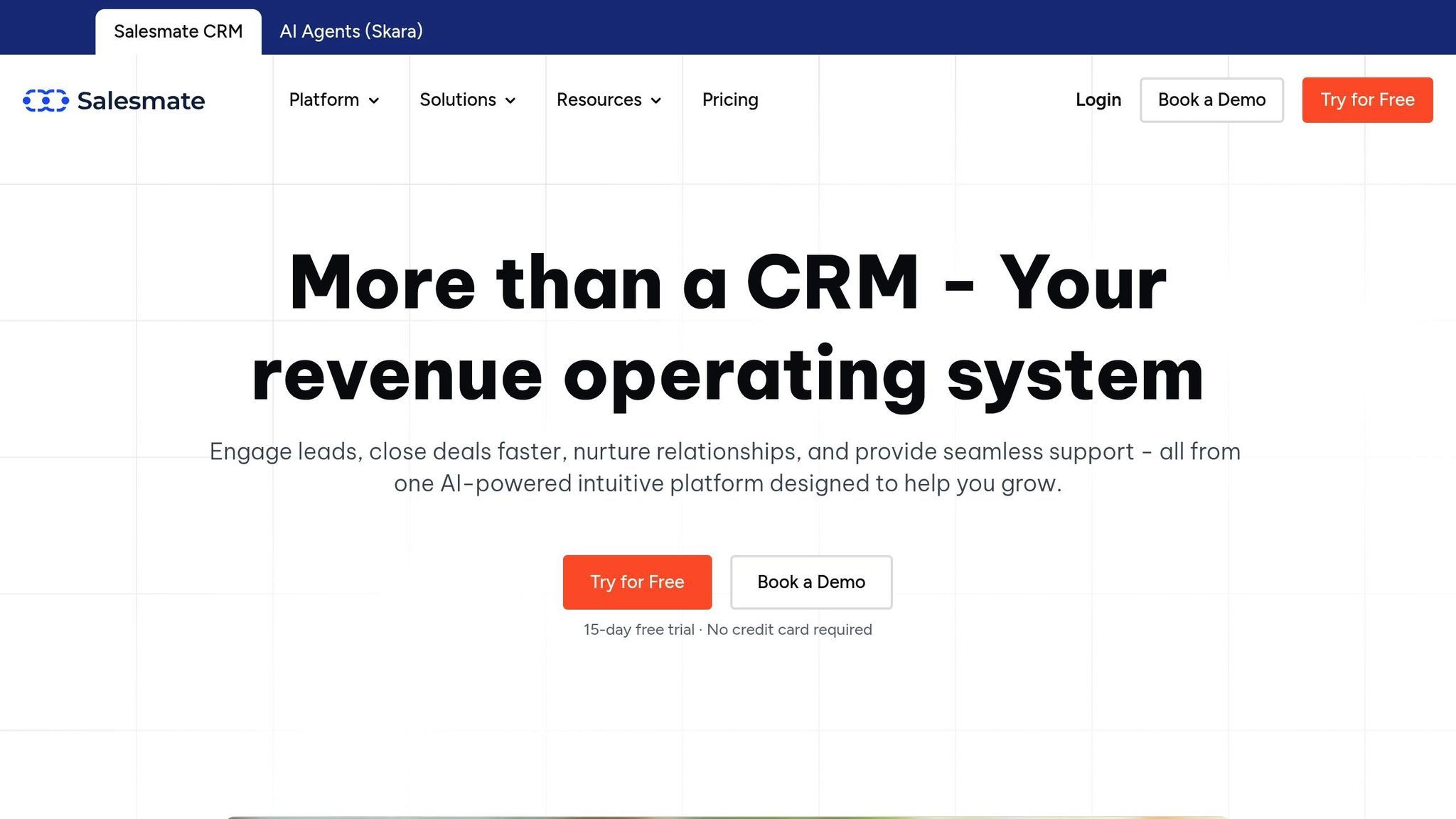
Salesmate is a comprehensive CRM that combines lead scoring with sales management in one platform. Instead of relying on separate tools for different tasks, Salesmate offers a unified solution that simplifies processes and boosts efficiency for businesses of all sizes.
What sets Salesmate apart is its ability to align sales and marketing teams by providing shared metrics to evaluate lead quality. Marketing teams can pinpoint the traits and behaviors that signal sales readiness, while sales teams gain a clearer understanding of how leads are scored.
AI and Machine Learning Capabilities
Salesmate uses machine learning to power its customizable lead scoring system. By analyzing engagement patterns, it continuously updates its scoring model in real time based on historical data and ongoing interactions. This adaptability ensures businesses can act on high-intent moments - like when a prospect visits a pricing page or downloads a critical resource - at exactly the right time.
Multi-Channel Integration
To provide a complete picture of each lead's activity, Salesmate pulls data from various sources, including email, website behavior, social media interactions, and direct sales engagements. Its AI ensures that casual browsers are filtered out, focusing attention on leads that are more likely to convert.
CRM and Platform Compatibility
As an all-in-one CRM, Salesmate works seamlessly within its own system. It also integrates well with other tools, making it a central hub for all sales operations. This eliminates the need for multiple software solutions, saving time and reducing costs while improving overall efficiency.
Automation Features
Salesmate streamlines sales workflows with automation tools that handle tasks from initial contact to follow-up. Teams can set up triggers based on lead behavior - such as sending an automatic follow-up email when a lead reaches a certain score. It also automates lead assignment and status updates, minimizing manual work and allowing teams to focus on high-priority leads.
Source: [3]
Tool Comparison Table
When selecting an AI lead scoring tool, it's important to consider factors like multi-channel support, integrations, and pricing. The table below outlines the key differences among seven popular tools to help you make a well-informed choice.
| Tool | Supported Channels | AI Capabilities | CRM/Platform Integrations | Pricing (USD) | Best Use Cases for US Teams |
|---|---|---|---|---|---|
| Persana AI | Multiple channels (details not specified) | Real-time behavioral scoring and predictive analytics | Not specified | Contact for pricing | Enterprise teams needing automated outreach with large contact databases |
| HubSpot Lead Scoring | Email, Social media, Website, Phone, Chat, Ads | Machine learning analysis of hundreds of data points, predictive conversion scoring | Native HubSpot CRM, 1,000+ app integrations via marketplace | $0 - $800/month | Small to enterprise businesses looking for an all-in-one marketing and sales platform |
| MadKudu | Email, Website, Product usage, CRM data | Behavioral scoring with machine learning, product-qualified lead identification | Salesforce, HubSpot | Contact for pricing | SaaS companies focused on product engagement and user behavior analysis |
| ProPair.ai | Primarily phone and SMS | High-velocity lead scoring | Not specified | Contact for pricing | Mortgage and lending teams handling high-volume, fast-paced sales cycles |
| Saleshub.ai | LinkedIn, Email, Website | AI-powered SDR automation and multi-channel engagement scoring | LinkedIn Sales Navigator, CRM platforms, Zapier | $20 - $150/month per seat | Teams emphasizing LinkedIn prospecting and automated social selling |
| Leadspace AI | Email, Website, Product usage, CRM data | Deep learning algorithms with real-time lead scoring updates | Salesforce | Contact for pricing | Enterprise B2B teams needing advanced predictive analytics and data enrichment |
| Salesmate | Multiple channels (details not specified) | Machine learning-based lead scoring with real-time updates | Native CRM system, third-party integrations via API | $15 - $50/user/month | Small to medium businesses seeking a unified CRM and lead scoring solution |
Key Insights for US-Based Teams
The table highlights several important considerations for teams in the United States:
Pricing Tiers: HubSpot stands out with a free tier, making it an excellent option for startups. Meanwhile, Salesmate starts at $15/user/month, appealing to growing businesses with budget-conscious needs. On the other hand, enterprise-grade tools like Persana AI, MadKudu, and Leadspace AI require custom pricing, reflecting their advanced features and ability to handle larger data volumes.
Channel Coverage: HubSpot offers extensive multi-channel support, including email, social media, website, phone, chat, and advertising, making it a strong choice for US teams managing diverse digital marketing campaigns. In contrast, ProPair.ai focuses on high-touch channels like phone and SMS, which is particularly useful for industries that demand immediate responses, such as mortgage lending or customer service.
Integration Options: Seamless integration is vital for streamlining workflows. HubSpot leads with its marketplace offering over 1,000 app integrations, while Saleshub.ai leverages Zapier to connect with a wide range of platforms, enhancing automation and efficiency.
Real-Time Scoring: Tools like Leadspace AI and Salesmate provide real-time scoring, helping sales teams engage with leads at the right moment - an essential feature for businesses aiming to maximize conversion opportunities.
According to Gartner research, businesses using AI-powered lead scoring tools experience an average 15% revenue increase, making these tools a worthwhile investment for teams with a high volume of leads[1]. Whether you're a startup, a growing business, or an enterprise team, the right tool can help improve lead management and drive better results.
Future Trends in AI Lead Scoring for Multi-Channel Platforms
AI-driven lead scoring is advancing at a rapid pace, with over 60% of U.S. B2B companies already using these systems. Businesses adopting real-time, multi-channel models are reporting up to a 30% increase in qualified lead conversion rates, signaling a shift in how organizations approach lead management.
Real-time scoring has become the new standard. Modern AI systems now update scores instantly as prospects interact, replacing older batch processes that updated only daily or weekly. This allows sales teams to engage with leads at just the right moment, improving conversion rates. For example, a boutique HR consulting firm leveraged AI-powered scoring to analyze website visits, email interactions, and LinkedIn engagement simultaneously, achieving a 25% increase in sales-qualified leads. This evolution is also enabling businesses to tap into emerging communication channels.
Expanding Communication Channels
The shift toward new communication channels is changing how businesses track and score leads. While email and phone have long been dominant, AI tools are now integrating with SMS, live chat, WhatsApp, and social media platforms. Tools like Jason AI by Reply take this a step further, analyzing real-time data from billions of contacts in 150+ languages to improve scoring accuracy.
These systems go beyond traditional metrics, analyzing individual behaviors, purchase intent, and engagement across various platforms to create hyper-personalized outreach. For instance, Alex AI by Persana AI uses real-time signals from a database of over a billion contacts and 75+ data sources to optimize engagement and meeting bookings.
AI SDR Agents and Predictive Analytics
AI-powered sales development representatives (SDRs) are revolutionizing how lead scoring integrates with sales processes. These automated agents don’t just score leads - they act on those scores through multi-channel campaigns. Landbase AI SDR, for example, autonomously researches B2B prospects and runs 24/7 outreach campaigns across email, LinkedIn, and phone, delivering highly personalized messaging. This marks a shift from scoring as a standalone activity to scoring as part of a fully automated sales process. As this integration deepens, predictive analytics will further refine how businesses identify and prioritize prospects.
Intent-driven predictive analytics are also becoming more advanced. Platforms like Unify AI SDR track hundreds of intent signals, including funding events, hiring trends, website visits, and technology adoption. This allows businesses to pinpoint high-potential leads before competitors do, providing a crucial edge in fast-paced markets.
Negative Lead Scoring and Integration Trends
Negative lead scoring is emerging as a practical approach to improve resource allocation. By identifying leads unlikely to convert, businesses can focus their efforts on prospects with genuine potential, saving time and energy for sales teams.
To overcome data silos, modern AI tools now offer APIs and pre-built integrations, enabling seamless access to comprehensive lead intelligence. Additionally, voice channel integration is gaining traction. AI systems are incorporating phone interactions and automated dialing into scoring algorithms. For instance, SuperSales by SuperAGI automates dialing as part of its AI-native sales platform, highlighting how voice data will soon play a bigger role in prioritizing leads.
Navigating AI SDR Solutions
For businesses exploring these AI-powered solutions, platforms like AI SDR Shop are becoming valuable resources. These directories provide detailed profiles of 80+ AI SDR agents, covering features, integrations, and use cases to help U.S. businesses navigate this growing landscape.
Privacy and Regulation
The regulatory environment is also influencing the direction of AI lead scoring. U.S. laws like the California Consumer Privacy Act (CCPA) are prompting tools to adopt privacy-by-design features such as data anonymization and consent management. These measures ensure compliance and build customer trust, while also driving further innovation in the space.
With advancements in real-time scoring, hyper-personalized outreach, and multi-channel integration, AI-powered lead scoring is reshaping how businesses engage with prospects. As these tools become more accessible and user-friendly, their adoption is expected to rise, creating a future where lead scoring operates seamlessly in the background, powering personalized engagement across every touchpoint.
Conclusion
AI-powered multi-channel lead scoring has reshaped how businesses identify and prioritize leads. Companies using these tools have reported up to a 20% boost in sales productivity[4] and a 10–15% improvement in lead conversion rates[4]. The ability to process hundreds of variables at once while tracking real-time behavioral signals gives sales teams a distinct edge in a competitive market.
Each tool comes with its own set of strengths tailored to specific needs - whether you're looking for a free solution, access to extensive databases, or advanced predictive analytics. The results speak for themselves, with businesses seeing a 30% increase in qualified leads and a 25% reduction in response time[9].
To get the most out of these tools, it’s important to align your selection with your operational goals. Think about your data sources, the channels where your prospects are active, and your team’s technical expertise. For instance, tools like Saleshub.ai are ideal for LinkedIn prospecting with real-time signal tracking, while Leadspace AI specializes in detailed firmographic analysis. Pricing varies widely, from free options to enterprise plans costing $150 or more per user per month.
For a streamlined evaluation process, AI SDR Shop offers a centralized platform that compares over 80 AI SDR agents. Instead of researching each tool individually, you can quickly review features, integrations, and use cases to find the best fit for your business.
As AI lead scoring continues to evolve, bringing real-time analysis and deeper personalization, businesses that embrace these tools now will be better equipped to seize future opportunities. With multi-channel data growing rapidly, AI’s role in unifying these insights is becoming increasingly essential. Start with a pilot program, measure the results, and scale up from there.
FAQs
How can AI tools for lead scoring boost sales team productivity?
AI tools for lead scoring simplify sales workflows by taking over repetitive tasks and pinpointing the leads most likely to convert. By analyzing data from various sources, these tools deliver clear insights, allowing sales teams to concentrate on high-value prospects. With guesswork out of the equation, these AI-driven tools help sales teams prioritize effectively, close deals more quickly, and make better use of their time and resources.
What should businesses look for when selecting an AI tool for multi-channel lead scoring?
When selecting an AI tool for multi-channel lead scoring, it's important to focus on factors that align with your business objectives and workflows. First, prioritize tools that offer smooth integration with your existing CRM or marketing platforms. This ensures efficient data sharing and minimizes disruptions to your processes. Next, assess the tool's ability to accurately score leads across various channels, such as email, social media, and website interactions. The tool should be capable of adapting to the unique behaviors and patterns of your audience. Another key factor is scalability - choose a tool that can grow alongside your business and manage larger data volumes as your operations expand. Additionally, look for features like detailed analytics and customizable reports that provide insights tailored to your specific needs, helping you make informed decisions. Lastly, ensure the tool offers a pricing structure that fits your budget while delivering strong value through its features and performance. Balancing cost with functionality is crucial for long-term success.
How does integrating multiple channels improve lead scoring accuracy?
Integrating multiple channels improves lead scoring by offering a fuller picture of customer behavior. By pulling data from sources like email campaigns, social media activity, and website interactions, AI tools can recognize patterns and rank leads with greater precision. This approach ensures that no key interactions slip through the cracks, leading to more accurate scoring and stronger alignment with sales strategies. With AI-powered tools tailored for multi-channel lead scoring, businesses can rely on data to zero in on prospects with the most potential.